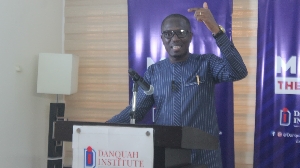- Home - Entertainment
- Lifestyle News
- Entertainment Videos | TV
- Year In Review
- Music News
- Entertainers
- Entertainment Archive
- Entertainment Photos
- Jokes
- Entertainment Headlines
- Ameyaw Debrah
- Brown GH
- Celebrities Buzz
- GH Base
- Ghana Celebrities
- Gh Gossip
- GH Page
- GH Splash
- Hot Gossip GH
- YEN

Music of Wednesday, 23 September 2009
Source: Statesman
Disappointed "NDC" Musicians Release Anti-Mills Song
In 2008 they recorded songs that helped the campaign of the National Democratic Congress. Rastafarian hiplife star, Sydney, who now goes by the name, Barima, made the song ‘Wonna Money’.
Though, the rights to the rendition on corruption in Ghana and Africa were purchased by the Akufo-Addo campaign team, it did not stop the NDC from blasting it across the country through campaign megaphones. It went down like a storm, cementing the perception of the NPP as mega-corrupt.
Moreover, the NDC went ahead to commission Sydney and Nana Oheneba to make an official campaign song titled ‘Afi ye sesam’ – ‘This year is for change’.
But, barely 8 months after Prof John Atta Mills was sworn into office, the same musicians, feeling the pinch like the majority of Ghanaians, have turned against the party that they helped to win power.
Next week, Sydney is coming out with his latest political song, Enko yie – meaning ‘It’s not working’.
The song, which talks about the economic hardship, the President’s apparent slowness in providing solutions and the general feeling of disappointment by many of those who voted for the NDC, features three other top artistes, with some amazingly affecting vocal turns.
The supreme ‘politi-musician A-Plus, Reggie Zippi of ‘Virgin’ fame and Nana Oheneba.
“The song simply amplifies what the man and woman on the streets are saying,” A-Plus explains. “It’s really a marriage that has gone sour. The problem is that this has happened a lot shorter than expected. Beyond that, the unhappy spouse knows that there are procedures to go through and it can take years before a divorce. So, perhaps, by coming public now it would put some useful pressure on the spouse to perform and deliver,” he adds with some optimism.
The Statesman got an exclusive hearing of the song, which is bound to be a massive hit on radios and social functions both in Ghana and abroad. Though it makes mention of no political party or person, it is clear who they are referring to – implied references are made about the NDC, NPP, President Mills, Muntaka Mubarak, ex-President Rawlings, Prophet T B Joshua and the notorious 1.5 billion cedis allegedly spent on beverages on the Transition Team.
The song compares the current feeling among Ghanaians to that of a man who leaves his wife to enter into a new marriage. One which he has sooner than later regretted but feels trapped by circumstances and cannot get out – at least not for some years to come. “Even my father-in-law” (meaning Mr Rawlings) “knows it and has been complaining about his own daughter.”
It talks about the disappointments of other family members (including footsoldiers of the NDC).
But, when the husband took time to check for himself the cause of the wife’s non-performance, it came to light that “Some Akonta Madanfo in Naija with a remote control is part of the problem.” This is in reference to reports that President Mills would not act without the say-so of his controversial spiritual guru, T B Joshua.
Oheneba says on the song that he’s sold his colour TV for a black & white set. He wanted change and now regrets not staying with the old partner, who, although, had some issues but she could still deliver.
Before, he could travel from Accra to Nsawam in two hours. But today things are just too slow, he does same journey in four hours – he steps on full throttle, but the car is still not pulling.
The chorus is that things are not going well, it’s moving as slow as a tortoise. I’ve made a bad decision and I’m locked up in it.
The beat is pacey and hip. Eventually, A-Plus comes in, slows things down and delivers a beautiful, melancholy on how the new wife has all of sudden changed and showing nothing close to the kind of care she showed before the wedding. Comparing the relationship to Sampson and Delila, A-Plus sings of treachery, deceit and selfishness that betray the trust he had in her.
Change has come but the change is rather in the woman and her attitude, negative. “She says there’s no money but I saw her chewing khebab. “Money no deh poh wey you deh chew chinchinga so!”
He wonders how the woman can complain of the husband not leaving any money for shopping yet she can prepare for herself tea, with bread, margarine, etc, worth about 1.5 billion and enjoy it alone.










